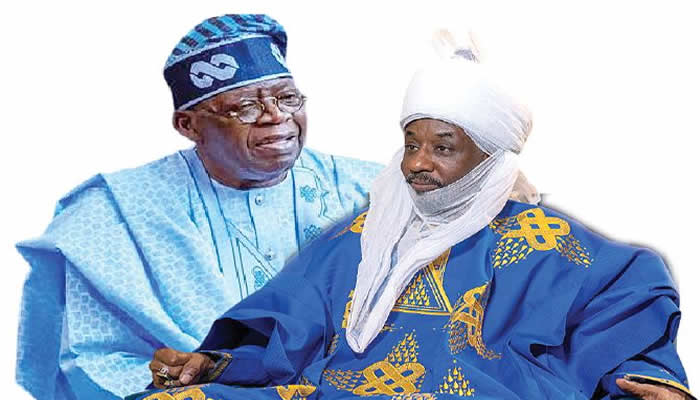The relationship between President Bola Tinubu and the Emir of Kano, Muhammad Sanusi II, has dramatically deteriorated from one of close alliance to open animosity. This unexpected rift has captured public attention, particularly due to Sanusi’s previous vocal support for Tinubu’s economic reforms. The current tension stems from a confluence of factors, including political maneuvering surrounding the Kano Emirate, ongoing legal battles over Sanusi’s dethronement, and differing perspectives on governance and economic policy. The public nature of the disagreement underscores the significant influence both figures hold in Nigerian politics and society.
Sanusi’s recent public declaration that he would not assist the Tinubu administration in explaining its economic policies ignited the current conflict. While Sanusi later attempted to clarify his remarks, the government’s swift and pointed response signaled a deep-seated tension. The Minister of Information, Mohammed Idris, asserted that the government did not require Sanusi’s endorsement, highlighting the administration’s confidence in its economic strategy and perhaps suggesting a perception of Sanusi’s critique as a personal attack rather than a policy disagreement. This exchange reveals a marked shift from the previously close ties between the two men, a relationship forged during Tinubu’s opposition years when Sanusi was removed as CBN Governor by then-President Goodluck Jonathan after exposing alleged financial improprieties.
The history between Tinubu and Sanusi reveals a complex interplay of political alliances and shared opposition. Tinubu championed Sanusi following his removal as CBN Governor, and played a key role in supporting Sanusi’s ascension to the Kano Emirate throne. This move was seen as both a restoration of Sanusi’s dignity and a symbolic rebuke to the Jonathan administration. However, Sanusi’s continued outspokenness on governance issues, particularly his criticism of then-Kano State Governor Abdullahi Ganduje, led to his dethronement in 2020. This event marked a turning point, with Ganduje, now the APC National Chairman, becoming a central figure in the ongoing tension between Tinubu and Sanusi.
The legal battle over the Kano Emirate throne forms a critical backdrop to the strained relationship between Tinubu and Sanusi. Sources suggest that the presidency, influenced by Ganduje, has actively supported the current Emir, Aminu Ado Bayero, in the legal proceedings against Sanusi. This alleged support, coupled with the belief that the presidency is aiming to split Kano State before the 2027 elections, has fueled Sanusi’s distrust and fueled the narrative of political maneuvering undermining traditional institutions. The perception that Tinubu is prioritizing political expediency over his past relationship with Sanusi further complicates the situation.
Sanusi’s public criticism of Tinubu’s economic policies, particularly the removal of fuel subsidies, adds another layer to the conflict. While initially supportive of the reforms, Sanusi later argued that they failed to adequately address the immediate hardships faced by Nigerians. His remarks, interpreted by some as a betrayal of his earlier stance, drew sharp rebukes from presidential aides who accused him of prioritizing personal grievances over the national interest. This public disagreement highlights the broader debate surrounding the short-term pain versus long-term gain of economic reforms, with Sanusi representing a voice concerned about the immediate impact on vulnerable populations.
The unfolding situation between Tinubu and Sanusi provides a glimpse into the intricate web of political alliances, personal loyalties, and policy disagreements within Nigerian politics. The breakdown of their relationship, once a symbol of shared opposition and mutual respect, underscores the volatile nature of political partnerships and the potential for divergent viewpoints to fracture even the strongest bonds. The ongoing legal battle for the Kano Emirate throne and the public debate surrounding economic policy serve as key battlegrounds in this evolving power struggle. The long-term implications of this rift, both for the individuals involved and for the broader political landscape, remain to be seen.














